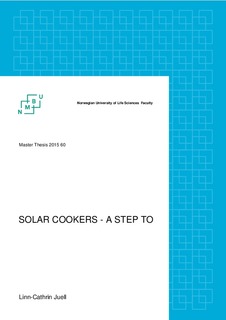Solar cookers - a step towards sustainable development : an analysis of the impact of solar cooking practices in Ajmer District, India
Master thesis
Permanent lenke
http://hdl.handle.net/11250/295728Utgivelsesdato
2015-08-10Metadata
Vis full innførselSamlinger
Sammendrag
This study aims to investigate the added value of solar cookers beyond energy by analyzing the implementation of solar cookers in Ajmer District, India. Furthermore the thesis seeks to evaluate the potential solar cooking technology to promote sustainable development.
Carbon-based biomass is a traditional source of energy in rural India, and accounts for over 90 per cent of the energy used for cooking purposes in the state of Rajasthan where the research for this study is conducted. Dependence on biomass for cooking is associated with negative environmental, economic and health impacts. Solar cooking technology may present a viable alternative to reduce the harmful effects of using carbon-based biomass. The assumption is that clean energy sources for cooking can provide multiple benefits such as improved health, reduced emissions and pressure on local natural resources, and increased income as a result of increased time autonomy.
Specifically the study aims to identify factors that enable or limit the success or failure and explore how people decide to adopt the use of solar cookers or not and how this impact people’s lives. The aim is to evaluate if solar cooking technology meet the criteria of appropriate technology and contributes to sustainable development. The discussion of the findings is based on the theory of appropriate technology, the capability approach and the innovation decision process theory.
I argue that the implementation of solar cookers in Ajmer District leads to multiple benefits. Especially the women involved in the solar cooking project experience great change in their lives by being socially and economically empowered. Although the solar cooking technology seems to meet all dimensions of sustainability, I argue that the wider effect of the experienced success is influenced by different factors involving economic affordability, sociocultural norms and political structures. Barefoot College and the Women Barefoot Solar Engineers Society have improved the livelihood of many rural people by adding solar energy to their lives. However, the appropriateness of the technology is limited by the fact that the device is too expensive for most people and does not fit the schedule of daily routines. The sustainability and the confirmation of the technology rests on several factors, and the potential of solar cooking technology to contribute to sustainable development will not be fulfilled unless it is affordable for the end-users.
Beskrivelse
The thesis explore the links between energy, technology and development and assess the appropriateness of solar cooking technology in Ajmer District, India.
A qualitative case study approach is applied to investigate the solar cookers impact beyond energy and its potential to meet all dimensions of sustainable development.

